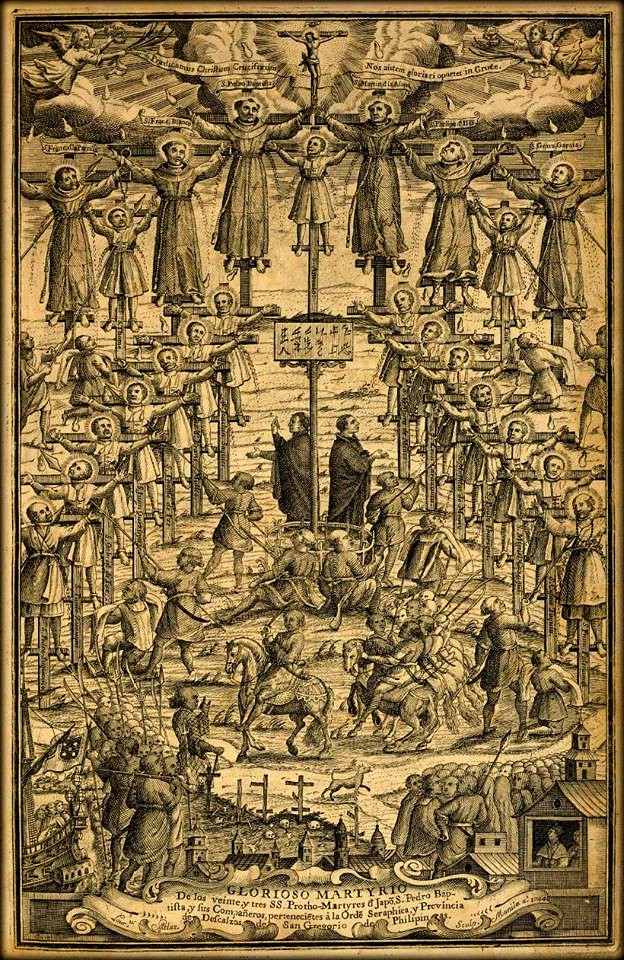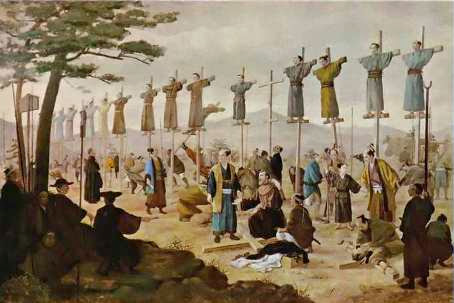Jesuit Fathers Peter Paul Navarro, Peter Onizuka and Dennis Fujishima
Bl Peter Paul Navarro, SJ
Born : December, 1560
Died : November 1, 1622
Beatified : May 7, 1867
Bl Peter Onizuka , SJ
Born : December, 1560
Died : November 1, 1622
Beatified : May 7, 1867
Bl Dennis Fujishima, SJ
Born : December, 1560
Died : November 1, 1622
Beatified : May 7, 1867
 Peter Paul Navarro was born in the small town of Laino, Basilicata in southern Italy. In 1579 when he was eighteen, he entered the Jesuit novitiate in Nola and requested to be sent to the Japanese mission. His request was granted and in 1584 he was sent to Goa, India for his studies and was ordained in 1585. A year later in August, 1586 he arrived in Hirado, western Japan. There he spent a year studying Japanese and served in mission posts in Shikoku and Honshu. Fr Navarro knew that to be successful in evangelizing the Japanese he himself must become one of them and this motivated him to speak and write fluently in the language. To prove to the Japanese that they did not have to relinquish their customs and cultural traditions to become Christians, he dressed like them, ate their food and used their type of furniture.
Peter Paul Navarro was born in the small town of Laino, Basilicata in southern Italy. In 1579 when he was eighteen, he entered the Jesuit novitiate in Nola and requested to be sent to the Japanese mission. His request was granted and in 1584 he was sent to Goa, India for his studies and was ordained in 1585. A year later in August, 1586 he arrived in Hirado, western Japan. There he spent a year studying Japanese and served in mission posts in Shikoku and Honshu. Fr Navarro knew that to be successful in evangelizing the Japanese he himself must become one of them and this motivated him to speak and write fluently in the language. To prove to the Japanese that they did not have to relinquish their customs and cultural traditions to become Christians, he dressed like them, ate their food and used their type of furniture.
Fr Navarro went to northern Kyushu which became the centre of his missionary activity after he was expelled from his Hirado missions because of persecutions against Christians. Later in 1614 when all foreign missionaries from Japan were expelled by the edict of Shogun Iyeyasu . Fr Navarro was one of the two dozen Jesuits who went underground rather than leave the country as more than eighty other priests had to. For the next seven years, he went about his priestly duties in Shimabara, western Kyushu, disguised as a beggar, wood seller, tradesman or farmer. In these disguises, Fr Navarro was able to enter the homes of Christians to celebrate Mass or administer the sacraments at night to avoid being captured since he was being hunted. During this period he wrote in Japanese, “An apology of the Christian Faith against the Calumnies of the Pagans.”
Peter Onizuka and Dennis Fujishima were the two catechists helping Fr Navarro during his final years in Shimabara. Peter was a teenager whose father housed fugitive priests. Dennis was in his forties and had been a Christian as a young man. Both of them were with Fr Navarro and his servant, Clement Yuemon, after Christmas in 1621 when they were all captured by priest-hunters. They were brought before the daimyo of Arima who treated the captives with great respect. The daimyo detained them in a house owned by a Christian where they were cared for by Christians and he even allowed Fr Navarro to celebrate Mass. He also came frequently to converse with Fr Navarro. The daimyo was prepared to release them if they could renounce Christianity, an offer which they turned down. The daimyo wanted to transfer them secretly to Macao where they could be set free. But before he could do anything, he received orders from the shogun that the three were to die by slow fire.
When Fr Navarro was informed of his impending death, he was happy that his prayers had been answered and wrote to his Jesuit friend, Fr John Baptist Zola, saying: “I give infinite thanks to the Lord and I ask you to thank him with me. I also ask your prayers for perseverance until my final breath.”
On the day of execution, November 1, Fr Navarro celebrated the Mass of All Saints and the two catechists, Peter and Dennis, who had asked to enter the Society, pronounced their Jesuit vows during that final Mass. While waiting for the executioners, Fr Navarro wrote his last letter to Fr Matthew de Couros: “For many years I have prayed for this great grace from God, but always with some fear that I would not be heard because of my many sins. The Father of mercies now gives me this long-desired grace. May he be blessed forever.”
 In the afternoon the four prisoners escorted by fifty soldiers and a large crowd of Christians made their way to the place of execution, with Fr Navarro chanting the Litany of Our Lady and his companions joyfully sang the responses. As they approached the shore, the martyrs saw the standing stakes awaiting them. The daimyo had instructed the soldiers to place the wood around the stakes so as not to prolong the prisoners’ suffering.
In the afternoon the four prisoners escorted by fifty soldiers and a large crowd of Christians made their way to the place of execution, with Fr Navarro chanting the Litany of Our Lady and his companions joyfully sang the responses. As they approached the shore, the martyrs saw the standing stakes awaiting them. The daimyo had instructed the soldiers to place the wood around the stakes so as not to prolong the prisoners’ suffering.
The three Jesuits, Frs Peter Paul Navarro, Peter Onizuka and Dennis Fujishima and their faithful servant, Clement Yeumon, alight in flames, gave final heroic witness of their great love for God.
They were beatified by Pope Pius IX together with another 201 martyrs of Japan on May 7, 1867
